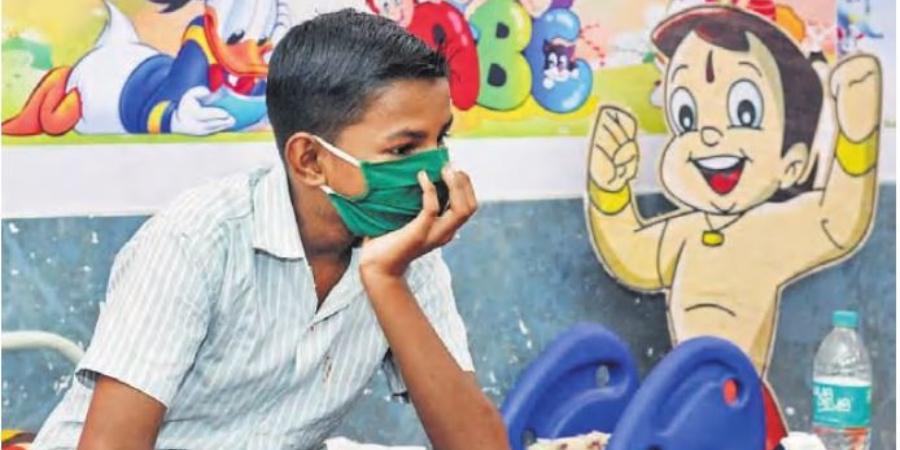New Delhi, Jun 17: The SARS-CoV-2 sero-positivity rate among children is high and comparable to the adult population and hence, it is unlikely that any future third wave of the prevailing COVID-19 variant would disproportionately affect children aged two years and above, according to the interim findings of an ongoing study conducted in the country.
The interim findings that have appeared on medRxiv, a pre-print server, are based on a mid-term analysis of the data of the 4,509 participants -- 700 children in the 2-17 years age group and 3,809 aged 18 years and above -- from five states.
The data collection period was from March 15 to June 10 from five sites -- Delhi Urban Resettlement Colony, Delhi Rural (villages in Faridabad district of Haryana under Delhi-NCR), Bhubaneswar Rural, Gorakhpur rural and Agartala rural.
The findings are part of an ongoing multi-centric, population-based, age-stratified prospective COVID-19 sero-prevalence study under WHO (World Health Organization) Unity studies conducted by experts, including doctors from the AIIMS -- Director Randeep Guleria and Professors from the Department of Centre for Community Medicine Puneet Misra, Shashi Kant and Sanjay K Rai -- in the five selected states with a proposed total sample size of 10,000.
"The seroprevalence was 55.7 per cent in the below 18 years age group and 63.5 per cent in the above 18 years age group. There was no statistically significant difference in prevalence between adult and children," the findings stated.
The site-wise numbers of available data among the 2-17 age group were 92, 189, 165, 146 and 108 for Delhi Urban Resettlement Colony, Delhi Rural, Bhubaneswar Rural, Gorakhpur Rural and Agartala Rural respectively.
The total serum antibody against the SARS-CoV-2 virus was assessed qualitatively by using a standard ELISA kit.
The study findings come amid concerns raised in the country regarding a probable third wave of COVID-19 where children and youngsters are likely to get affected the most.
Irrespective of the age group, rural sites had a lower sero-positivity rate compared to the urban site (in Delhi). Within the rural sites, children had a slightly lower sero-positivity rate compared to adults. However, this differential prevalence was not observed in the urban site, according to the findings.
"There was a slightly higher sero-positivity rate observed among female children. This finding was in contrast to the meta-analysis where it was shown that the prevalence is higher in men. This may be a chance finding due to small number of data available at the time of mid-term analysis," the study stated.
The higher seropositivity rate in children aged 10-17 years may be reflective of their higher mobility and independence compared to the younger children.
As reported in the literature, a large proportion of children (50.9 per cent) had asymptomatic COVID-19 infection.
In India, the sero-prevalence among children and youngsters was estimated as a part of a larger nationwide survey on adults. The second nationwide sero-prevalence study done in August-September 2020 had reported a nine per cent seropositivity among 3,021 children aged 10-17 years while according to this study, it is 60.3 per cent.
Let the Truth be known. If you read VB and like VB, please be a VB Supporter and Help us deliver the Truth to one and all.
Ottawa (PTI): Three Indian nationals have been arrested by Canadian police on an anti-extortion patrol and charged after bullets were fired at a home.
Harjot Singh (21), Taranveer Singh (19) and Dayajeet Singh Billing (21) face one count each of discharging a firearm, and all have been remanded in custody until Thursday, the Surrey Police Service (SPS) said in a statement on Monday.
The suspects were arrested by patrol officers after an early morning report of shots fired and a small fire outside a home in Surrey's Crescent Beach neighbourhood, the LakelandToday reported.
On February 1, 2026, the SPS members were patrolling in Surrey’s Crescent Beach neighbourhood when reports came in of shots being fired and a small fire outside a residence near Crescent Road and 132 Street.
The three accused were arrested by SPS officers a short time later, the statement said.
SPS’s Major Crime Section took over the investigation, and the three men have now been charged with Criminal Code offences, it said.
All three have been charged with one count each of discharging a firearm into a place contrary to section 244.2(1)(a) of the Criminal Code.
The investigation is ongoing, and additional charges may be forthcoming. All three have been remanded in custody until February 5, 2026.
The SPS has confirmed they are all foreign nationals and has engaged the Canada Border Services Agency, it said.
One of the suspects suffered injuries, including two black eyes, the media report said.
Surrey police Staff Sgt. Lindsey Houghton said on Monday that the suspect had refused to comply with instructions to get out of the ride-share vehicle and started to "actively resist."
"As we were trained, he was taken to the ground and safely handcuffed," said Houghton.
A second suspect with a black eye was also injured in the arrest after refusing to comply, Houghton said.
The arresting officers were part of Project Assurance, an initiative that patrols neighbourhoods that have been targeted by extortion violence.
Houghton said the Canada Border Services Agency (CBSA) is also involved because the men are foreign nationals, and the trio may face additional charges.
It's not clear if the men are in the country on tourist visas, a study permit, or a work permit, but Houghton said CBSA has started its own investigation into the men's status.
Surrey has seen a number of shootings at homes and businesses over the last several months, but there's been an escalation since the new year.





